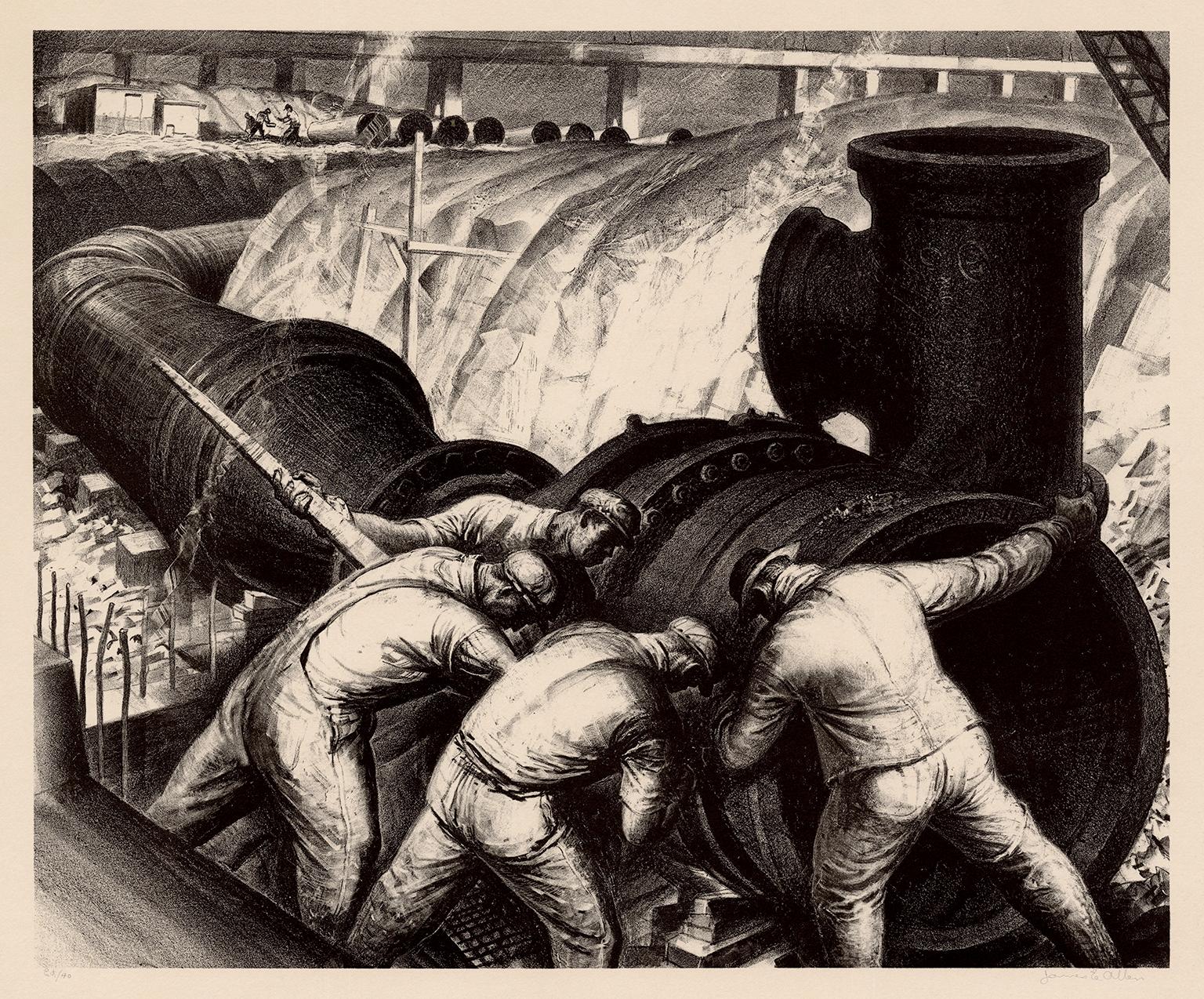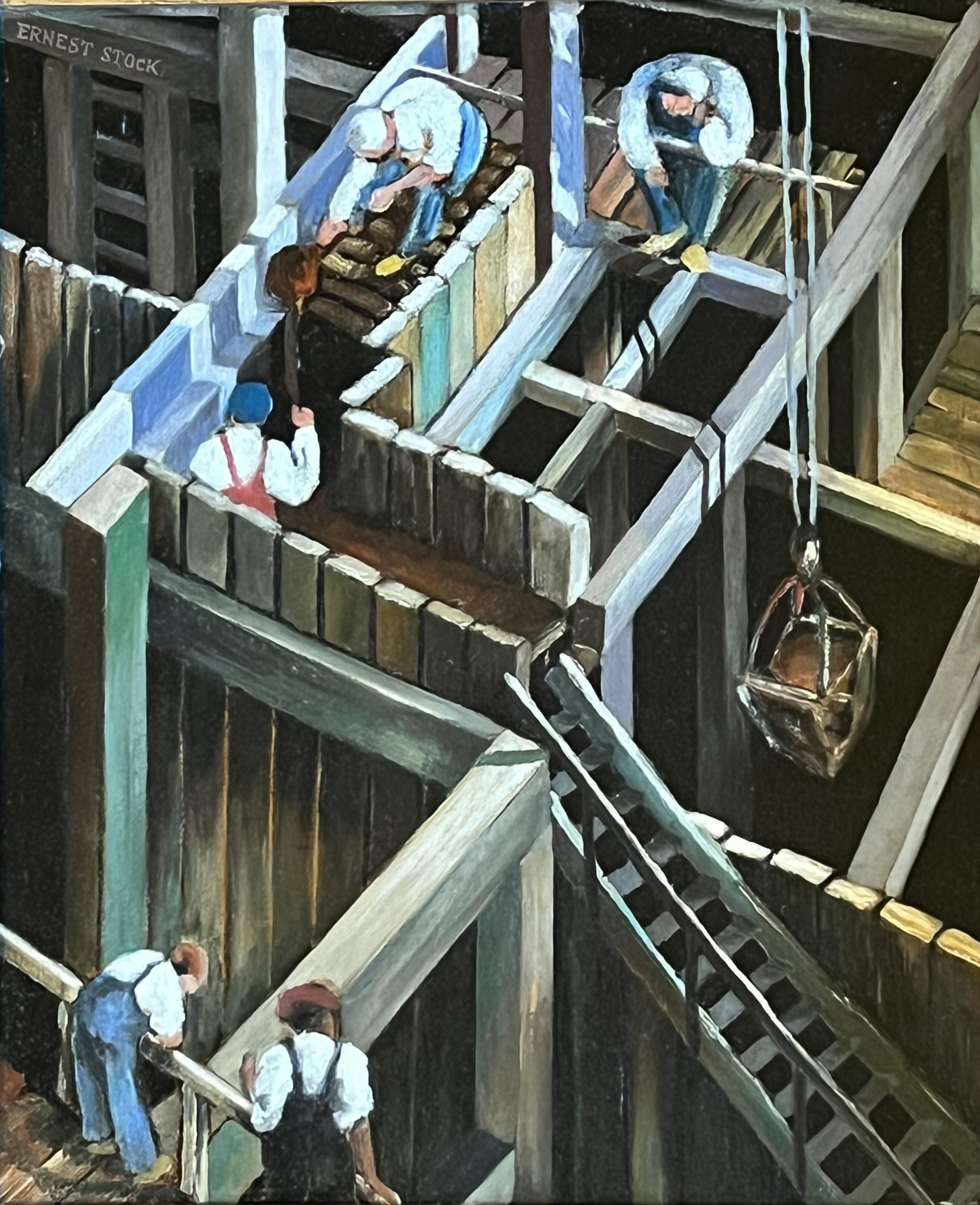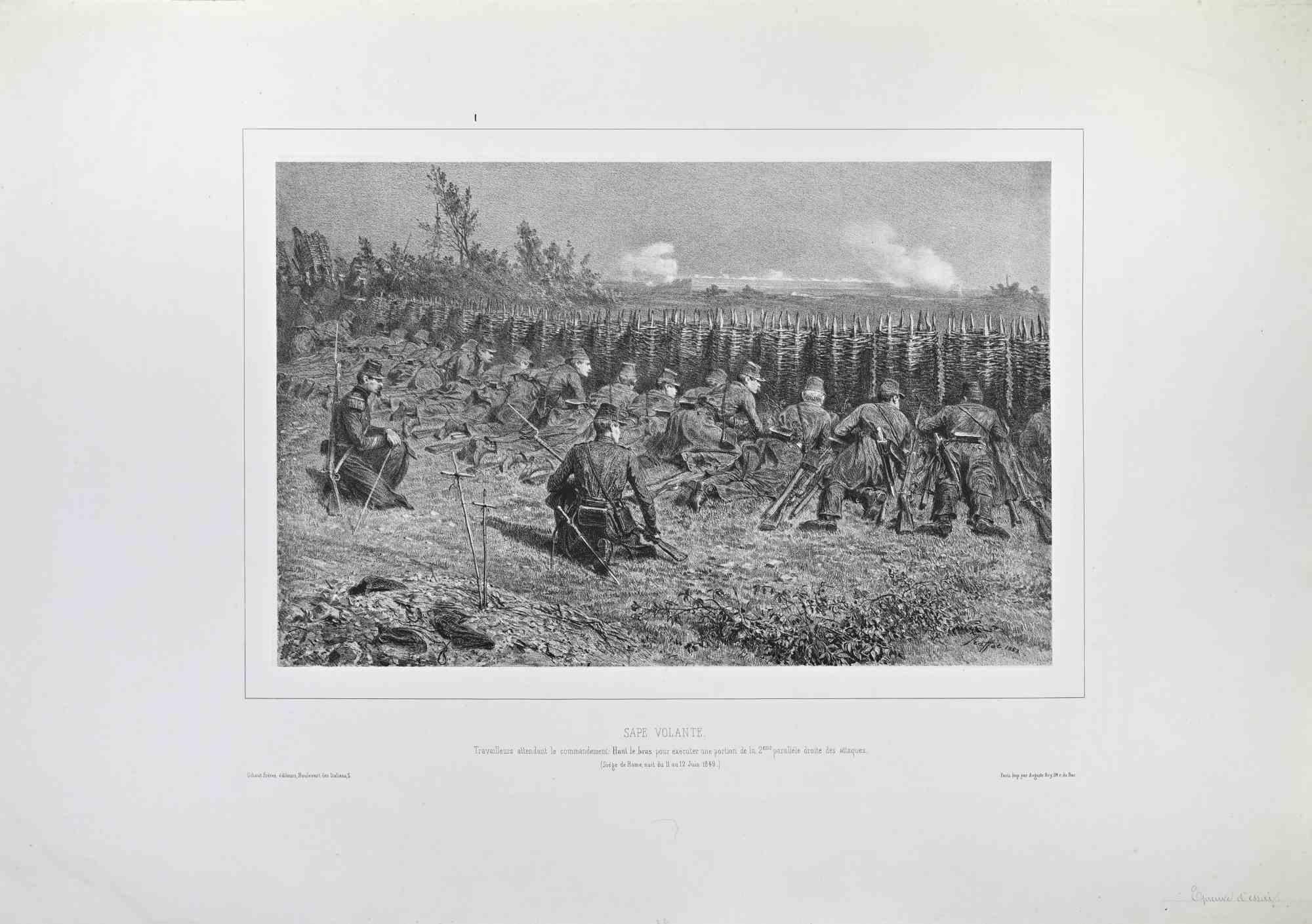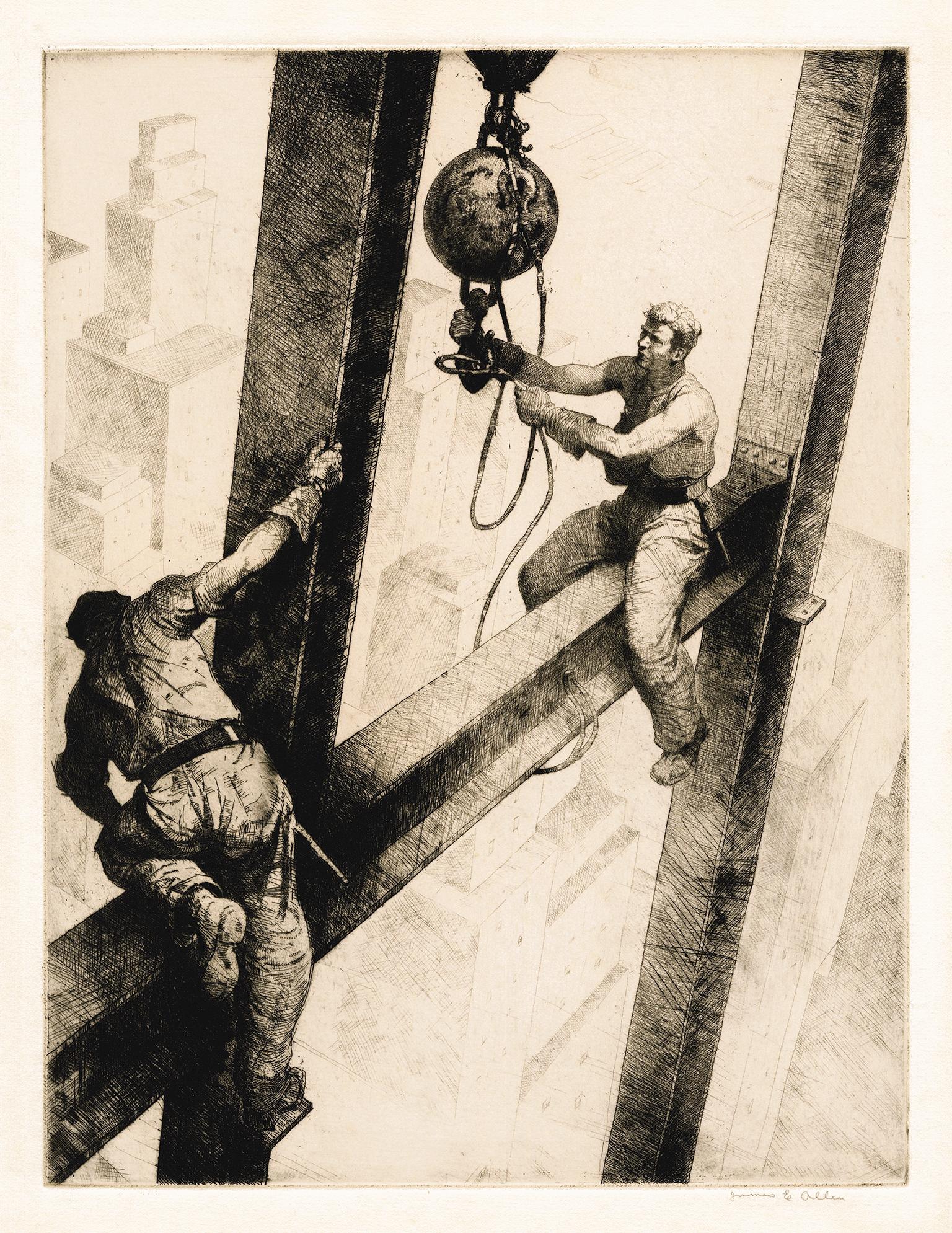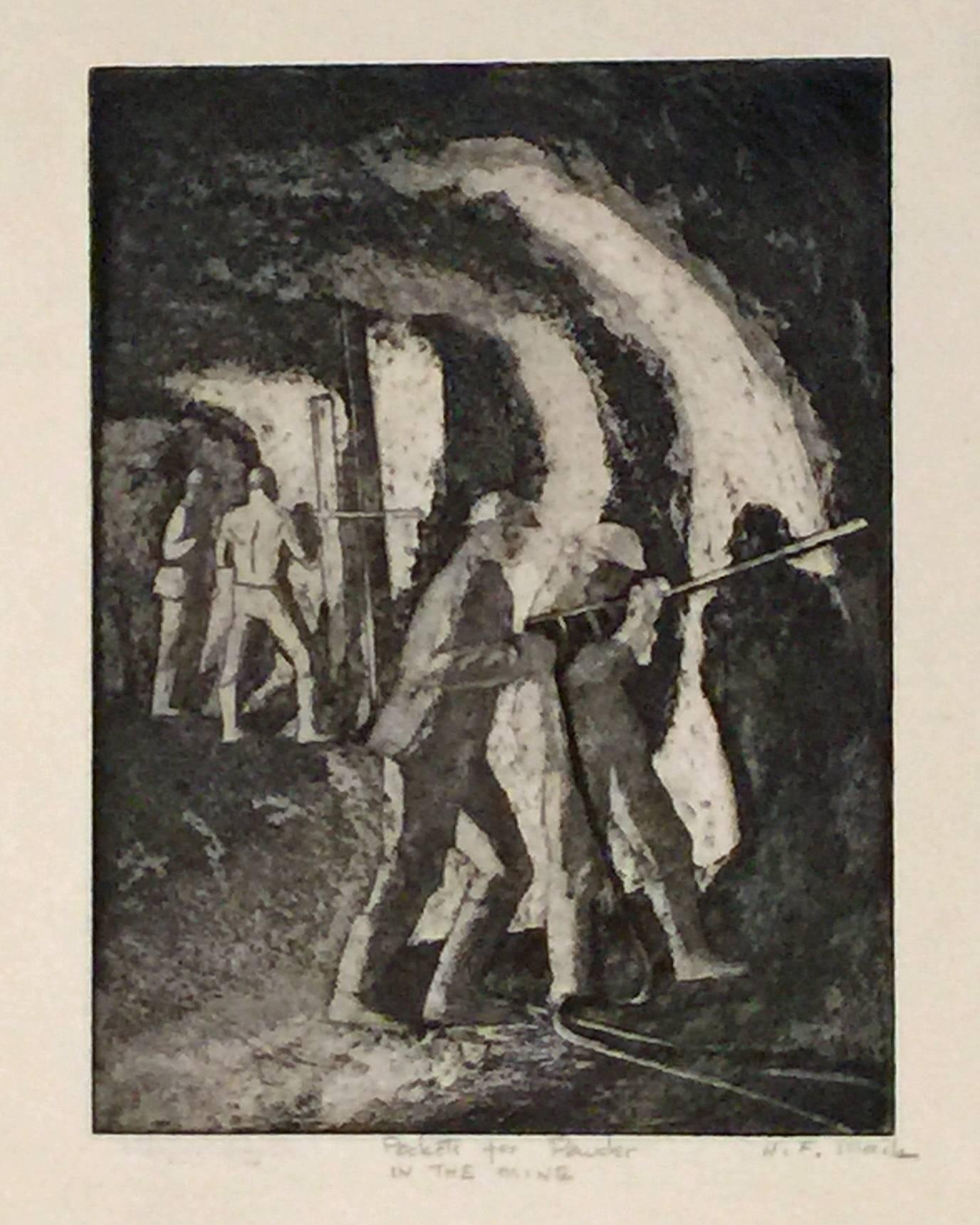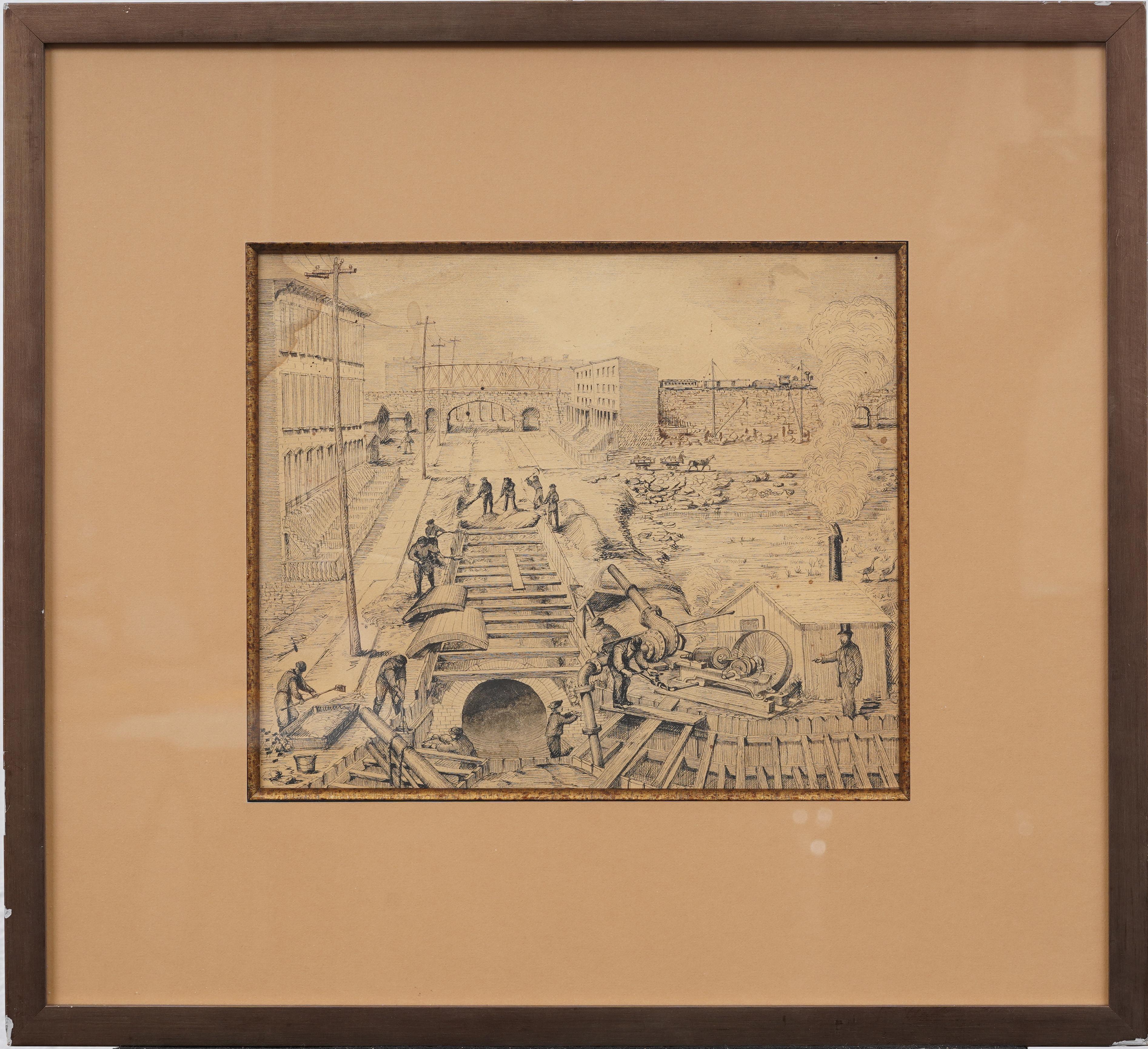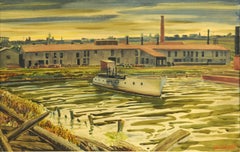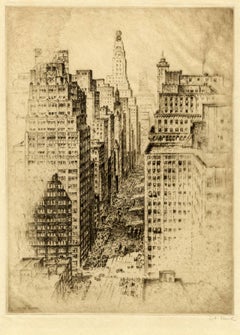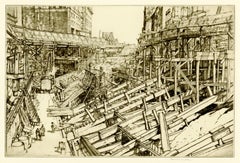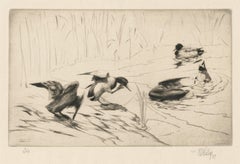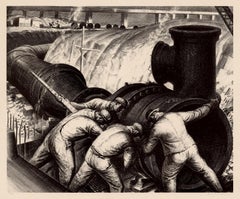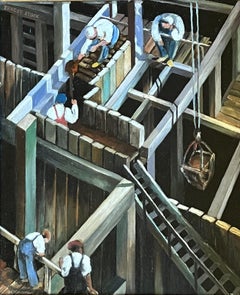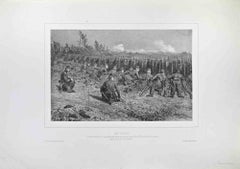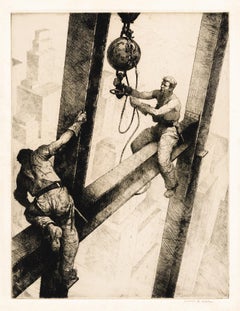Items Similar to The Trench
Want more images or videos?
Request additional images or videos from the seller
1 of 10
James AllenThe Trench1937
1937
$1,750
£1,329.17
€1,535.63
CA$2,452.69
A$2,745.02
CHF 1,432.69
MX$33,475.09
NOK 18,336.47
SEK 17,357.82
DKK 11,460.19
Shipping
Retrieving quote...The 1stDibs Promise:
Authenticity Guarantee,
Money-Back Guarantee,
24-Hour Cancellation
About the Item
The Trench
Lithograph, 1937
Signed and annotated in pencil (see photos)
Edition: 30
Provenance:
Estate of the Artist
Mary Ryan Gallery
Frac Teck Services, Ft. Worth, TX
Part of a series of 12 images commissioned by United States Foundry Company in 1937.
Note: An impression is in the collection of the National Museum of American Art
Reference:
Ryan 43
Condition: Excellent
Image: 15 1/4 x 10 1/2"
Sheet: 18 3/4 x 13 3/8";
James E. ALLEN
"Author of approximately 100 prints, both lithographs, and etching, of which circa 10 have yet to be identified, James E. Allen (1894-1964) is today remembered as a printmaker, while his lifetime fame came from his illustrations. Raised in rural Montana, in 1913 Allen made his way to Chicago to study at the School of the Art Institute. He made an impression on fellow artist and his senior by 30 years, Alexis John Fournier, for who he was a studio assistant for about a year from 1915 to 1916. After a brief stint in the Interlaken Community of artists in New Jersey, Allen joined the war effort with the American Expeditionary Forces in Germany where James became a 2nd Lieutenant and flier. Upon his return home, and after marrying a Chicago woman, he first settled in New Jersey before moving more permanently to New York City, where he found most of his illustration work. A few months spent in Paris, where he shared studio space with wood engraver Howard Cook, gave Allen the opportunity to discover printmaking and develop technical abilities that would serve him well. James E. Allen’s etchings usually present glorified depictions of construction works building modern America. His lithographs tend to focus more on rural American life. In both oeuvres, a pride in work and life well-lived permeates each composition." Courtesy Armstrong FA
"James E. Allen (b. 1894, Louisiana, MO – d. 1964, Larchmont, NY) was an important American printmaker famous for his etchings and lithographs that documented the heroic worker and the American industry of the 1930s. He was born in Louisiana, MO, and raised in Montana, but left home in 1911 to study painting and drawing at the Art Institute of Chicago. Soon after, he moved to New York where he took classes at the Art Students’ League, the Grand Central School of Art, and the Hans Hoffman School. Ever the perfectionist, Allen studied illustration with Harvey Dunn and etching with Joseph Pennell and William Auerbach-Levy. He also worked with sculptor Naum M. Los to improve his sense of 3-dimensional form, and spent almost seven years experimenting with copper and acid before allowing his prints to be exhibited.
With the advent of World War I, Allen was an established illustrator, working as a staff artist for Doubleday-Page Publishing Company. He also produced illustrations for publications such as Colliers and the Saturday Evening Post, but left when the war broke out to volunteer his services as a fighter pilot. In 1925 he moved to Paris where he met Howard Cook. The two artists shared a studio and began to experiment with a variety of printmaking techniques. Allen created his first etching during this time. Allen systematically absorbed the teachings of his “graphic heroes” Kasimir Malevich and Paul Cezanne. He admired the work of the Cubists and George Rouault, but he continued to search for economy of line and careful orchestration of tone in his own work. Unlike many artists of the time, Allen always worked directly from the model, executing exhaustive life-size charcoal studies for all of his prints.
During The Great Depression, Allen returned to New York, working consistently in the field of commercial art. His etchings and lithographs began to receive widespread academic and critical acclaim around 1932 when his etching “The Builders” garnered both a Shaw Prize from New York’s Salmagundi Club and a Henry B. Shope Award from the Society of American Etchers. A year later, “Brazilian Builders” took a Charles M. Lea Award at the Philadelphia Print Club Exhibition (at the same exhibition Howard Cook, George Burr, and Ernest Roth all received an “Honorable Mention” for their submissions). Allen also began exhibiting his work in galleries during the 1930s, including at Kennedy and Company and the Grand Central Art Gallery. He later exhibited and acted as a juror for exhibitions at the Society of American Etchers.
Currently, Allen's work is included in Art for the Millions: American Culture and Politics in the 1930s, a group exhibition at the Metropolitan Museum of Art focused on artwork of the 1930s. He has also been included in solo and group exhibitions at the British Museum, London, UK; Heckscher Museum of Art, NY; Norman Rockwell Museum, MA; Terra Museum of American Art; and Valley House Gallery & Sculpture Garden, TX, among others.
Allen’s work is included in numerous private and public collections, among them the British Museum, UK; Cleveland Art Museum, OH; Columbus Museum of Art, OH; Fine Arts Museum of San Francisco, CA; Museum of Modern Art, NY; Metropolitan Museum, NY; National Gallery of Art, Washington D.C.; Smithsonian American Art Museum, Washington D.C. and Terra Museum of American Art, IL, among others.
Mary Ryan Gallery published a monograph with an introduction by David Kiehl in conjunction with a major solo exhibition of Allen’s prints in 1984." Courtesy Mary Ryan Gallery
- Creator:
- Creation Year:1937
- Dimensions:Height: 18.75 in (47.63 cm)Width: 13.38 in (33.99 cm)
- Medium:
- Movement & Style:
- Period:
- Condition:
- Gallery Location:Fairlawn, OH
- Reference Number:Seller: FA97581stDibs: LU14014814392
About the Seller
5.0
Recognized Seller
These prestigious sellers are industry leaders and represent the highest echelon for item quality and design.
Gold Seller
Premium sellers maintaining a 4.3+ rating and 24-hour response times
Established in 1978
1stDibs seller since 2013
798 sales on 1stDibs
Typical response time: <1 hour
Associations
International Fine Print Dealers Association
- ShippingRetrieving quote...Shipping from: Fairlawn, OH
- Return Policy
Authenticity Guarantee
In the unlikely event there’s an issue with an item’s authenticity, contact us within 1 year for a full refund. DetailsMoney-Back Guarantee
If your item is not as described, is damaged in transit, or does not arrive, contact us within 7 days for a full refund. Details24-Hour Cancellation
You have a 24-hour grace period in which to reconsider your purchase, with no questions asked.Vetted Professional Sellers
Our world-class sellers must adhere to strict standards for service and quality, maintaining the integrity of our listings.Price-Match Guarantee
If you find that a seller listed the same item for a lower price elsewhere, we’ll match it.Trusted Global Delivery
Our best-in-class carrier network provides specialized shipping options worldwide, including custom delivery.More From This Seller
View AllBreaking Up of the Penelope
By Edward Dobrotka
Located in Fairlawn, OH
Breaking Up of the Penelope
watercolor on artists watercolor board, 1942
Signed and dated by the artist lower right (see photo)
Exhibitions:
Cleveland, OH, The Cleveland Museum of Art, May 3 - June 11, 1944: "The 26th Annual Ehibition of Works by Artists and Craftsmen of the Western Reserve," , (label on verso)
Youngstown OH, The Butler Insititue of American Art, 1943: "1943 New Year Show," , (label on verso)
"Ed Dobrotka was one of comic-book illustrator Joe Shuster's early assistants. In the studio, he worked on the 'Superman' series, inking the pencils of artists including Shuster, John Sikela, Leo Nowak and Wayne Boring.
Dobrotka did do some pencilling of his own, however he returned to inking exclusively in 1945. In the following years, he worked with Sikela on the 'Superboy' series until the 1950s. He has also work on the solo 'Lois Lane...
Category
1940s American Realist Landscape Drawings and Watercolors
Materials
Watercolor
7th Avenue Canyon
By Anton Schutz
Located in Fairlawn, OH
7th Avenue Canyon
Etching, 1927
Signed and titled in pencil by the artist (see photo)
Depicts what was then referred to s the Garment Disctrict in New York City.
References And Exhib...
Category
1920s American Modern Landscape Prints
Materials
Etching
Ontario St. Grading and Temporary Ramps
By Louis Conrad Rosenberg
Located in Fairlawn, OH
Ontario St. Grading and Temporary Ramps
Drypoint, August 1929
Signed in pencil lower right (see photo)
From: The Cleveland Set (23 plates), this being No. 13
Edition: Small
A brilliant example of American industrial art. A wonderful, rich impression, with lots of burr and contrasts.
Louis Conrad Rosenberg
1890-1983
An American architectural etcher and engraver of the 1920's and 1930's era, Louis Conrad Rosenberg first studied at the Massachusetts Institute of Technology. He then enrolled at the Royal College of Art, London, to study etching techniques under Malcolm Osborne...
Category
1920s American Modern Landscape Prints
Materials
Drypoint
Lice
Located in Fairlawn, OH
Lice (Mallards grooming themselves)
Drypoint, 1927
Signed and dated lower right (see photo)
Titled lower left corner
Condition: Excellent
Image/Plate size: 6 7/8 x 10 3/4 inches
Shee...
Category
1920s American Realist Animal Prints
Materials
Drypoint
As We Were
By Art Werger
Located in Fairlawn, OH
As We Were
Mezzotint printed on Hannemuelle Copperplate paper, 2014
Signed and dated in pencil lower right (see photo)
Titled lower left (see photo)
Chop stamp of the publisher, The ...
Category
2010s Contemporary Figurative Prints
Materials
Mezzotint
Refinery Scene
By Paul H. Winchell
Located in Fairlawn, OH
Refinery Scene
Lithgrah, c. 1930
Signed in pencil lower right. (see photo)
Edition c. 14
Two impressions in the artist's estate. The other impression I sold to Dave and Reba Willia...
Category
1930s American Realist Landscape Prints
Materials
Lithograph
You May Also Like
'Pipe and Brawn' — WPA Era American Realism
By James Allen
Located in Myrtle Beach, SC
James Allen, 'Pipe and Brawn,' 1937, lithograph, edition 40. Signed and annotated 'Ed/40' in pencil. A superb, richly inked impression on cream wove paper, the full sheet with margin...
Category
1930s American Realist Figurative Prints
Materials
Lithograph
Subway Construction
Located in Los Angeles, CA
This painting is part of our exhibition American Coast to Coast: Artists of the 1930s
Subway Construction, c. 1928, oil on board, 19 x 15 ¾ inches, signed upper left, artist and title verso; exhibited: 1) 12th Annual Exhibition of the Society of Independent Artists, The Waldorf Astoria, New York NY, from March 9 to April 1, 1928, no. 864 (original price $250) (see Death Prevailing Theme of Artists in Weird Exhibits, The Gazette (Montreal, Quebec, Canada), March 8, 1928); 2) Boston Tercentenary Exhibition Fine Arts and Crafts Exhibition, Horticultural Hall, Boston MA, July, 1930, no. 108 (honorable mention - noted verso); 3) 38th Annual Exhibition of American Art, Cincinnati Art Museum, Cincinnati, OH, June, 1931 (see Alexander, Mary, The Week in Art Circles, The Cincinnati Enquirer, June 7, 1931); and 4) National Art Week Exhibition [Group Show], Montross Gallery, New York, New York, December, 1940 (see Devree, Howard, Brief Comment on Some Recently Opened Exhibitions in the Galleries, The New York Times, December 1, 1940)
About the Painting
Ernest Stock’s Subway Construction depicts the excavation of New York’s 8th Avenue line, which was the first completed section of the city-operated Independent Subway System (IND). The groundbreaking ceremony was in 1925, but the line did not open until 1932, placing Stock’s painting in the middle of the construction effort. The 8th Avenue line was primarily constructed using the “cut and cover” method in which the streets above the line were dug up, infrastructure was built from the surface level down, the resulting holes were filled, and the streets reconstructed. While many artists of the 1920s were fascinated with the upward thrust of New York’s exploding skyline as architects and developers sought to erect ever higher buildings, Stock turned his attention to the engineering marvels which were taking place below ground. In Subway Construction, Stock depicts workers removing the earth beneath the street and building scaffolding and other support structures to allow concrete to be poured. Light and shadow fall across the x-shaped grid pattern formed by the wooden beams and planks. It is no surprise that critics reviewing the painting commented on Stock’s use of an “interesting pattern” to form a painting that is “clever and well designed.”
About the Artist
Ernest Richard Stock was an award-winning painter, print maker, muralist, and commercial artist. He was born in Bristol, England and was educated at the prestigious Bristol Grammar School. During World War I, Stock joined the British Royal Air Flying Corps in Canada and served in France as a pilot where he was wounded. After the war, he immigrated to the United States and joined the firm of Mack, Jenny, and Tyler, where he further honed his architectural and decorative painting skills. During the 1920s, Stock often traveled back and forth between the US and Europe. He was twice married, including to the American author, Katherine Anne Porter. Starting in the mid-1920s, Stock began to exhibit his artwork professionally, including at London’s Beaux Arts Gallery, the Society of Independent Artists, the Salons of America, the Cincinnati Art Museum, the Whitney Studio and various locations in the Northeast. Critics often praised the strong design sensibility in Stock’s paintings. Stock was a commercial illustrator for a handful of published books and during World War II, he worked in the Stratford Connecticut...
Category
1920s American Modern Figurative Paintings
Materials
Oil
The French Trench - Lithograph by Auguste Raffet - Mid 19th century
Located in Roma, IT
The French Trench is an artwork realized by Auguste Raffet (1804-1860) in the 1860s.
Belongs to the series "Souvenir d'Italie - Expédition de Rome".
Lithograph, signed and dated by...
Category
Mid-19th Century Modern Figurative Prints
Materials
Lithograph
'The Connectors' — Vintage American Realism, New York City
By James Allen
Located in Myrtle Beach, SC
James Allen, 'The Connectors', 1934, etching, edition not stated, Ryan 66. Signed in pencil. A superb, richly-inked impression, on handmade, cream laid paper, with margins (1/2 to 1...
Category
1930s American Realist Figurative Prints
Materials
Etching
POCKETS FOR POWDER IN THE MINE
By Harry F. Mack
Located in Portland, ME
Mack, Harry F. POCKETS FOR POWDER IN THE MINE. Etching with aquatint, not dated, but circa 1930s. Titled and signed "H. F. Mack" in pencil. 7 7/8 x 6 inches (plate), 10 3/4 x 9 1/4 i...
Category
1930s Figurative Prints
Materials
Etching, Aquatint
Historic Topographical Building New York Subway Train System Landscape Drawing
Located in Buffalo, NY
Antique American important and historic drawing by John Avery, Ink on paper. Provenance from Kennedy Gallery. Framed. Measuring 19 by 23 inches overall and 12 by 15.5 drawing alone. ...
Category
1890s Realist Landscape Paintings
Materials
Ink, Archival Paper, Pencil
$796 Sale Price
20% Off
More Ways To Browse
Fournier Paris
Norman Rockwell Pencil Drawings
James E Allen
Burr Wood Sculpture
William Auerbach Levy
Pablo Picasso Serigraph
Peter Max Heart
Peter Max Signed Serigraph
Picasso Knight
Renee Jacobs
Romare Bearden 1980
Rose Piper
Salvador Dali Signed Paradise
Scorpio Art
Shepard Fairey Andre The Giant
Sosaku Hanga
Studio Boheme
Used Anatomy Skeleton
